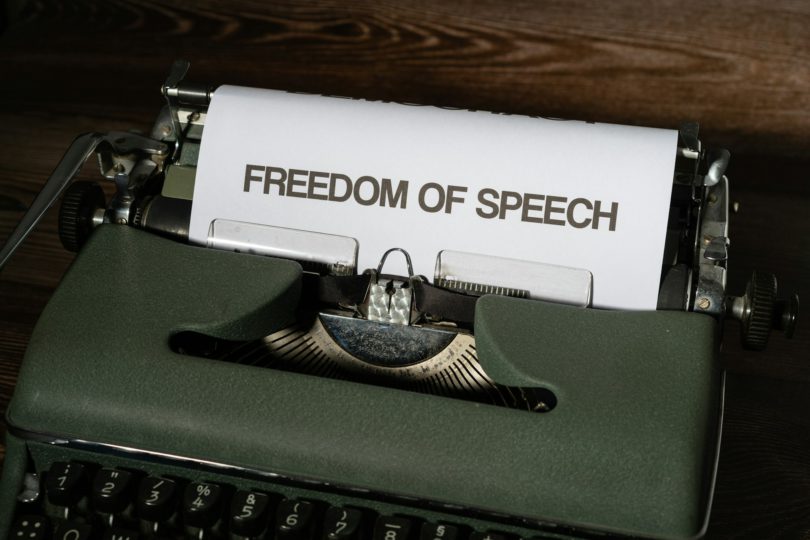Over the past few weeks, it’s been hard to ignore just how loudly the words “free speech” and “censorship” are being thrown around in American media. Politicians, pundits, and public figures all seem eager to declare themselves victims of suppression. But behind the headlines and hashtags, it’s worth taking a closer look at what genuine First Amendment violations actually are — because they don’t come from social media bans or audience backlash. Real censorship happens when the government steps in to silence speech.
Here are a few recent stories that cut through the confusion and show what government overreach looks like in practice.
A Poet’s Speech Silenced
Author and former Utah Poet Laureate Paisley Rekdal recently shared that she was disinvited from a speaking engagement at the U.S. Air Force Academy. Her offense? Posting critical remarks about Donald Trump on social media.
“I had the right to say what I liked on social media,” Rekdal explained, “and the academy had the right to decide who speaks on its campus.” But she also noted that this kind of cancellation sends a chilling message — especially to writers and artists who rely on public institutions for their livelihoods.
It’s one thing to be criticized online. It’s another when a government-run institution cancels your appearance because of your personal political opinions. That’s not just discouraging — it edges uncomfortably close to official censorship.
Turning a Children’s Book Into a Political Weapon
At a Religious Liberty Commission event hosted by Donald Trump, a 12-year-old boy was invited to share how he had been “forced” to read My Shadow Is Pink — a picture book that explores gender identity — in class. Trump and his team framed the moment as a case of “radical gender ideology” in schools.
The book’s author, Scott Stuart, quickly responded, accusing Trump of twisting his work for political gain. “The irony,” Stuart said, “is that they want acceptance for their beliefs but refuse to extend that same acceptance to others.”
In this case, censorship takes a subtler form. It’s about transforming art — even a children’s story — into a tool of fear and control. It’s about deciding which stories are acceptable for young readers and which are not, often under the banner of “protecting” them.
History Rewritten on the Road
While libraries and schools are already facing intense scrutiny over what materials they offer, another kind of historical editing is happening on a national scale. The Trump administration has turned the Institute of Museum and Library Services (IMLS) into a kind of cultural propaganda machine through its “Freedom Trucks” project — a supposedly patriotic traveling exhibit marking America’s 250th birthday.
On paper, it sounds celebratory. But critics say the initiative glosses over darker chapters of U.S. history, presenting a sanitized version that aligns with one administration’s political goals. The White House has even announced plans to review Smithsonian exhibits to ensure they “align with President Trump’s interpretation of American history.”
It’s a chilling echo of Orwell’s warning: “Who controls the past controls the future.” When the government dictates how history should be told, that’s not patriotism — it’s censorship disguised as national pride.
Professors and Librarians Under Pressure
The ripple effects of this political climate are being felt in classrooms and libraries across the country.
At Texas A&M University, a professor was recently fired after a video circulated online showing her discussing gender identity in a children’s literature class. The clip sparked outrage among conservative lawmakers and prompted intervention from the U.S. Department of Justice — a stunning escalation that blurs the line between public debate and state punishment.
Meanwhile, in Maricopa County, Arizona, a quieter but equally troubling story has unfolded. Twelve public libraries have quietly removed more than fifty books on puberty, sex education, and body development after complaints from conservative Christian groups. These removals came soon after three Republicans were elected to the county’s Board of Supervisors — suggesting political influence, not community consensus, drove the decision.
City-operated libraries, like those in Phoenix, remain unaffected — for now. But the precedent is clear: when politicians can dictate what books belong on public shelves, the freedom to read becomes conditional.
Why This All Matters
The First Amendment is often misunderstood. It doesn’t guarantee freedom from criticism or from consequences in the private sphere — social platforms, publishers, and universities can and do make decisions about speech all the time. What it does protect is the right to express ideas without punishment or suppression by the government.
That’s why these examples matter. From poets and professors to children’s authors and librarians, they reveal a pattern of governmental interference that quietly shapes what Americans are allowed to say, teach, and remember.
Free speech doesn’t disappear with a single book ban or canceled talk — it erodes, one silenced voice at a time.
If we care about protecting that right, we need to recognize the difference between being unpopular and being unlawfully silenced. The former is part of democracy. The latter is the beginning of its end.

